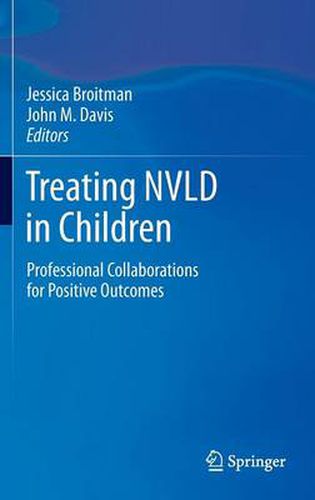Readings Newsletter
Become a Readings Member to make your shopping experience even easier.
Sign in or sign up for free!
You’re not far away from qualifying for FREE standard shipping within Australia
You’ve qualified for FREE standard shipping within Australia
The cart is loading…






This title is printed to order. This book may have been self-published. If so, we cannot guarantee the quality of the content. In the main most books will have gone through the editing process however some may not. We therefore suggest that you be aware of this before ordering this book. If in doubt check either the author or publisher’s details as we are unable to accept any returns unless they are faulty. Please contact us if you have any questions.
Children with nonverbal learning disabilities (NVLD) have needs that can take many forms and may, over time, require consultation and collaboration with professionals from several fields. Given that multiple specialists may be involved in working with children with NVLD - as well as the array of treatment variables - even seasoned practitioners may find themselves in confusing situations.
Treating NVLD in Children takes a developmental view of how the problems and needs of young people with nonverbal learning disabilities evolve and offers a concise guide for professionals who are likely to contribute to treatment. Expert practitioners across specialties in psychology, education, and rehabilitative therapy explain their roles in treatment, the decisions they are called on to make, and their interactions with other professionals. Collaborative interventions and teamwork are emphasized, as are transitions to higher learning, employment, and the adult world.
Among the book’s key features are:
A new four-subtype model of NVLD, with supporting research. A brief guide to assessment, transmitting results, and treatment planning. Chapters detailing the work of psychologists, therapists, coaches, and others in helping children with NVLD. Material specific to improving reading, writing, and mathematics.
Overview of issues in emotional competency and independent living.
An instructive personal account of growing up with NVLD.
Treating NVLD in Children: Professional Collaborations for Positive Outcomes is a key resource for a wide range of professionals working with children, including school and clinical child psychologists; educational psychologists and therapists; pediatricians; social workers and school counselors; speech and language therapists; child and adolescent psychiatrists; and marriage and family therapists.
$9.00 standard shipping within Australia
FREE standard shipping within Australia for orders over $100.00
Express & International shipping calculated at checkout
This title is printed to order. This book may have been self-published. If so, we cannot guarantee the quality of the content. In the main most books will have gone through the editing process however some may not. We therefore suggest that you be aware of this before ordering this book. If in doubt check either the author or publisher’s details as we are unable to accept any returns unless they are faulty. Please contact us if you have any questions.
Children with nonverbal learning disabilities (NVLD) have needs that can take many forms and may, over time, require consultation and collaboration with professionals from several fields. Given that multiple specialists may be involved in working with children with NVLD - as well as the array of treatment variables - even seasoned practitioners may find themselves in confusing situations.
Treating NVLD in Children takes a developmental view of how the problems and needs of young people with nonverbal learning disabilities evolve and offers a concise guide for professionals who are likely to contribute to treatment. Expert practitioners across specialties in psychology, education, and rehabilitative therapy explain their roles in treatment, the decisions they are called on to make, and their interactions with other professionals. Collaborative interventions and teamwork are emphasized, as are transitions to higher learning, employment, and the adult world.
Among the book’s key features are:
A new four-subtype model of NVLD, with supporting research. A brief guide to assessment, transmitting results, and treatment planning. Chapters detailing the work of psychologists, therapists, coaches, and others in helping children with NVLD. Material specific to improving reading, writing, and mathematics.
Overview of issues in emotional competency and independent living.
An instructive personal account of growing up with NVLD.
Treating NVLD in Children: Professional Collaborations for Positive Outcomes is a key resource for a wide range of professionals working with children, including school and clinical child psychologists; educational psychologists and therapists; pediatricians; social workers and school counselors; speech and language therapists; child and adolescent psychiatrists; and marriage and family therapists.